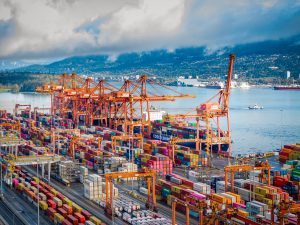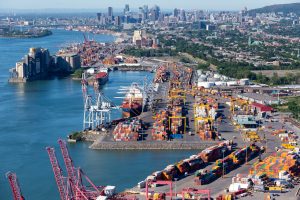By Leo Ryan, Editor
After unanimously passing second reading in the House of Commons on Tuesday, the government’s anti-scab legislation banning the use of replacement workers during a strike or lockout in federally-regulated industries – including ports and railways – has moved closer to eventual passage. It now goes for further study before parliament’s Human Resources Committee, where suggested changes cannot be excluded.
Bill C-58 is a key feature of the Supply and Confidence Agreement struck in 2022 between the minority Liberal Party and the New Democratic Party. Apart from the Liberal and NDP members of the House of Commons, the opposition Conservatives led by Pierre Poilievre also voted in favour of the bill – thereby clarifying publicly for the first time its position since the bill was introduced last November.
“We are mid-way through a monumental change in labour relations,” stated Labour Minister Seamus O’Regan after the second reading vote.
“We are banning replacement workers because we believe in collective bargaining,” Mr. O’Regan said.
“At the end of the day, we here are convinced that this will lead to greater stability for our supply chains, as well as a huge improvement for workers’ rights in this country.”
“This is an important day for workers across Canada as anti-scab legislation moves closer to becoming law,” said NDP leader Jagmeet Singh. “More than ever, workers need security, and bargaining power to fight for fair wages and better working conditions. Left on their own, the Liberals would have taken the side of the bosses and not have introduced this bill. The NDP forced them to do it.’’
For its part, the Canadian Union of Public Employees commented that “while we are pleased that the legislation is moving forward, it’s not perfect. There are loopholes still that employers can use to undermine workers’ rights, and we are asking that those be closed.”
Nine anti-scab bills have been introduced by the NDP over the past 15 years. In 2016, when such legislation finally came to a vote, 140 Liberals and 76 Conservatives voted to block it.
On the marine industry front in the past few years, unionized docker strikes at the British Colombia ports of Vancouver and Prince Rupert (summer 2023) and Montreal (2020 and 2021) disrupted billions of dollars of trade and wreaked havoc on supply chains. But the Port of Quebec has been the scene of a rare and prolonged lockout, with 80 longshore workers locked out by employers since September of 2022.
In Canada, for a number of years only Quebec and British Columbia have labour legislation which prohibits employers from replacing striking or locked-out workers. But it applies only to provincially-regulated workplaces and does not apply to sectors under federal jurisdiction.
What critics see as a distinctly cumbersome feature of the proposed legislation is the clause that it will only come into force 18 months after it obtains final passage– purportedly to give the agencies involved sufficient time to adopt to the new regulations. This puts the timing of implementation to within months of the next scheduled federal election in 2025.
The long-anticipated ‘anti-scab’ legislation recently drew rapid approval from labour union circles but also sharp criticism from industry groups ranging from small business to manufacturers and grain exporters.
Shipper and business perspectives
Perrin Beatty, President of the Canadian Chamber of Commerce, has pointed out that, though not often used, replacement workers permit organizations in sectors like trucking, rail, ports, telecom and air to preserve critical services.
The Canadian Federation of Independent Business (CFIB) has labelled Bill C-58 as “terrible news for small businesses.”
“If passed, this bill could prolong the duration of strikes and increase their frequency,” commented Jasmin Guenette, CFIB’s vice-president. “There’s a reason why similar bills were always voted down. They put too much power in the hands of large unions, and they are a threat to the economy as a whole. It looks like this bill is introduced for political reasons and not because it’s necessary.”
In a recent interview with Maritime Magazine, offering national shipper perspectives, concerns and amendment suggestions was Bob Ballantyne, Special Adviser to the Freight Management Association of Canada (FMA). The broad-based industry association represents more than 100 companies that purchase more than $4 billion in freight services annually.
“While the FMA respects the rights of workers, there does have to be consideration of the impacts of work stoppages in many industries that are critical to the functioning of the Canadian economy and the resulting broad impacts on Canadian society,” he said, adding: “We saw that in the recent strike at the west coast ports.”
“Many of the industries that will be impacted by Bill C-58, including all transportation modes, are industries that are vital to the functioning of the Canadian economy and to the health and well-being of virtually all Canadian citizens,” Mr. Ballantyne continued.
“It is vital that the government consider the balance between the rights of workers and the rights of Canadian society, more broadly. With this in mind, we think that the government should consider amendments, either to Bill C-58, or to the Canada Labour Code that will address the need to protect the broad Canadian society during work stoppages.”

(Dreamstime photo of Parliament of Canada and Unifor union photo showing lock-out dockers demonstrating at Port of Quebec)








